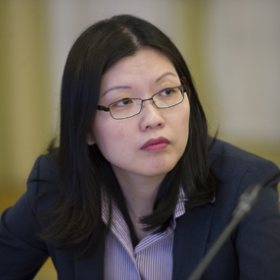
Piin-Fen Kok Speaks to NTDtv on Japanese Prime Minister’s U.S. Visit
Piin-Fen Kok, director of the EastWest Institute’s China, East Asia and United States Program, spoke to New Tang Dynasty Television on April 30 about Japanese Prime Minister Shinzo Abe’s recent visit to the United States. Joined by political commentator Chen Pokong and speaking in Mandarin, Kok also addressed a number of related issues, including the U.S.-Japan security alliance, negotiations for the Trans-Pacific Partnership free-trade agreement and U.S.-China-Japan relations.
Key excerpts from her comments are translated below.
On the revised U.S.-Japan defense guidelines:
“The recent update of the U.S.-Japan defense guidelines is aimed at enabling the U.S. and Japan to respond jointly and more effectively to the security challenges of the 21st century…This certainly affects China, and in recent years the U.S. and Japan have both been paying close attention to China’s maritime actions and its hardening posture in the East and South China Seas; however, I personally believe that this update does not specifically target China…The update is timely and prescient, and is predominantly meant to allow Japan, as the United States’ primary ally in Asia, to take on greater security responsibilities”
On the Trans-Pacific Partnership (TPP) and the Asian Infrastructure Investment Bank (AIIB):
“The TPP is very important to both the U.S. and Japan. From the U.S. point of view, the TPP is a key part of its ‘Asia Strategy’ and the strategic focus of its economic policy in Asia. In Japan, Abe has spent a great deal of domestic political capital to push for progress on the TPP. He hopes that joining the TPP would push forward domestic reforms in Japan, particularly in agriculture and the economy.
The AIIB and TPP clearly serve two different functions and cannot be compared directly. The TPP negotiations are moving into their final stages. If an agreement can be reached and implemented within a short period of time, it would have a positive effect on the United States’ reputation, standing and influence in Asia…While the AIIB puts some pressure on the TPP negotiations, the TPP’s main obstacles and sources of pressure come more from U.S. and Japanese domestic politics than from strategic pressures.”
On Abe’s speech in Congress:
“I believe those who wanted Abe to apologize directly [for Japan’s role using ‘comfort women’ during World War II] were disappointed, as he himself did not actually apologize. He also did not directly address the topic of ‘comfort women’…Though Abe expressed remorse and pledged self-reflection [on this issue], there are still people who would want a sincere apology from Abe himself. ”
On the U.S.-Japan alliance’s impact on China-Japan and U.S.-China relations:
“There has always been strategic mistrust in China-Japan and U.S.-China relations. The mistrust between China and Japan is mostly the result of historical issues and the relationship has been afflicted by a sense that the war remains ‘unsettled.’ I think a stronger U.S.-Japan alliance would deepen mistrust between China and Japan, particularly on military issues. Abe himself hopes that Japan can ‘normalize’ as a country and break free from the restrictions set by its pacifist constitution.
I believe Japan and the U.S. must, through public diplomacy, clarify and explain to China and other Asian countries how a closer U.S.-Japan alliance, particularly a closer military alliance, can benefit the entire region.”

